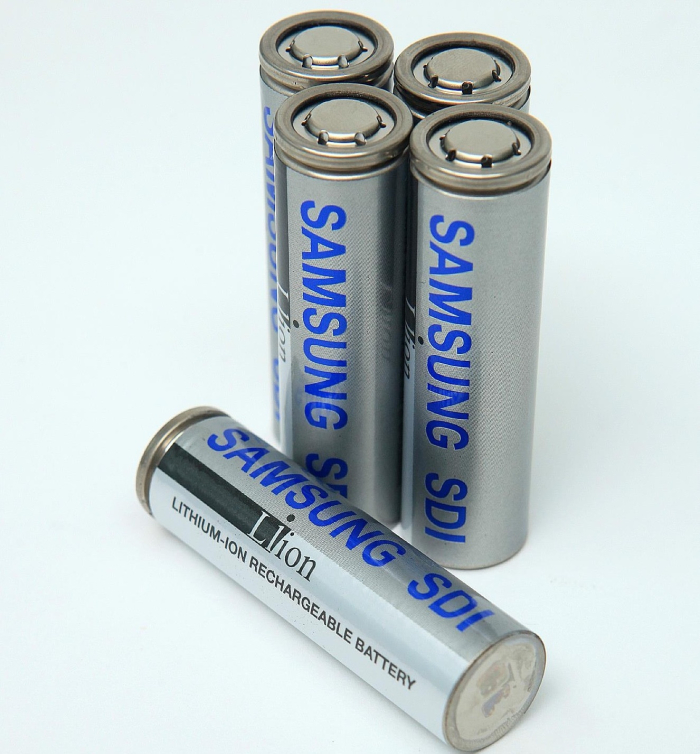Car batteries
Samsung SDI to supply cylindrical cells to Hyundai, Kia
By Apr 13, 2021 (Gmt+09:00)
3
Min read
Most Read
LG Chem to sell water filter business to Glenwood PE for $692 million


Kyobo Life poised to buy Japan’s SBI Group-owned savings bank


KT&G eyes overseas M&A after rejecting activist fund's offer


StockX in merger talks with Naver’s online reseller Kream


Mirae Asset to be named Korea Post’s core real estate fund operator



The cylindrical cells will be installed in hybrid cars to be launched by the carmaking group's two units, according to battery industry sources on Apr. 12. A hybrid vehicle contains an electric battery and a combustion engine.
Details of their supply deal have not been disclosed. But their business tie-up in the hybrid car segment could expand into a broader range of areas, including EVs and future mobility services, industry watchers said.
Both Hyundai and Kia have mainly used pouch-type batteries supplied by LG Energy Solution Ltd. and SK Innovation Co.
Cylindrical cells are among the most widely used packing styles for primary and secondary batteries and the advantages are ease of manufacture and good mechanical stability. The 4680 battery cells Tesla Inc. are currently developing are the cylinder type.
Industry watchers say Samsung SDI's cylindrical batteries under development for Hyundai and Kia might be bigger than the existing cylindrical type used by Tesla. The larger the battery is in size, the higher capacity and energy density it has, lowering manufacturing costs.
Back in 2018, Samsung SDI was picked as the exclusive supplier of cylindrical batteries by Jaguar Land Rover. With the supply contract, the UK carmaker then became the first global carmaker to adopt cylindrical-type batteries for hybrid cars, excluding Tesla.
Once Samsung SDI supplies car batteries to Hyundai, it could eventually become a parts supplier for cars to be produced on Hyundai Motor Group's proprietary Electric-Global Modular Platform (E-GMP) going forward, the sources added.
Relationships between the two companies' parent groups, ranked first and second in the country, have been improving since Samsung pulled out of the car business in 2000, less than a decade after it entered the market.
In May 2020, Hyundai Motor Group Executive Vice Chairman Chung had a rare meeting with Samsung Electronics Vice Chairman Lee Jae-yong during his visit to a Samsung battery production facility south of Seoul. At the time, industry watchers regarded it as a prime opportunity for business cooperation.
Since the meeting of their de-facto leaders, both groups have continued working-level discussions to cooperate in various sectors, including battery, semiconductor and infotainment, said a conglomerate source. "Their areas of cooperation will grow."
Hyundai Motor Group has been stepping up joint efforts in autonomous cars and EVs, including the development of EV batteries. Samsung produces the full range of parts installed in cars, ranging from batteries to semiconductor chips to electronic components.
Together with LG Electronics Inc., Hyundai Motor has jointly developed the interior concept of a future car, further consolidating their cooperation in self-driving vehicles.
Last month, South Korean EV battery makers were caught off guard when Volkswagen AG announced it would gradually switch the type of batteries used in its EVs away from those made by Korean suppliers and make its batteries in-house. The German carmaker added it would roll out a new unified prismatic battery cell design from 2023 to reduce production costs and improve efficiency.
LG Energy and SK Innovation have been manufacturing pouch-type batteries for Volkswagen. Samsung SDI is its only Korean supplier for the prismatic type.
Among three types of batteries, the prismatic type accounted for 49.2% of the global EV battery market in 2020, followed by the pouch with 27.8% share and cylindrical at 23%, according to industry tracker SNE Research.
Write to Byung-Uk Do at dodo@hankyung.com
Yeonhee Kim edited this article.
More to Read
-
 Battery stocksMarket jitters grow over Korean battery shares after VW’s decision
Battery stocksMarket jitters grow over Korean battery shares after VW’s decisionMar 18, 2021 (Gmt+09:00)
3 Min read -
 EV batteriesKorean battery shares tumble as VW gears up for in-house production
EV batteriesKorean battery shares tumble as VW gears up for in-house productionMar 16, 2021 (Gmt+09:00)
4 Min read -
 EV battery plantsLG Energy to invest over $4.5 bn to expand US battery facilities
EV battery plantsLG Energy to invest over $4.5 bn to expand US battery facilitiesMar 12, 2021 (Gmt+09:00)
3 Min read -
 Battery plantsLG Energy may build US, Europe plants to supply new batteries to Tesla
Battery plantsLG Energy may build US, Europe plants to supply new batteries to TeslaMar 10, 2021 (Gmt+09:00)
2 Min read -
 EV batteriesLG Chem beats CATL, Panasonic to supply batteries for Tesla’s Model Y SUV
EV batteriesLG Chem beats CATL, Panasonic to supply batteries for Tesla’s Model Y SUVNov 20, 2020 (Gmt+09:00)
3 Min read
Comment 0
LOG IN


